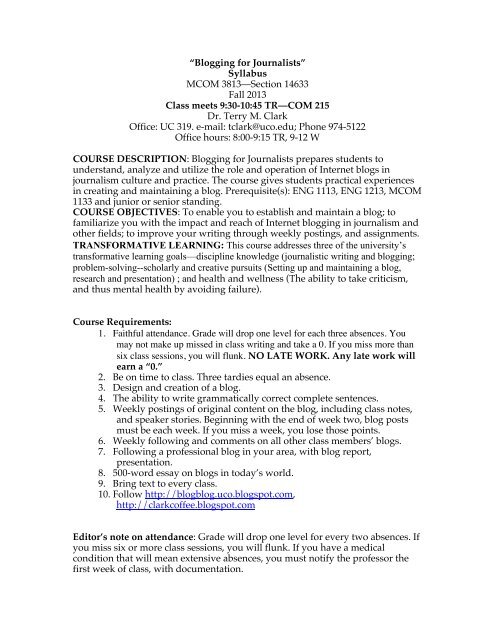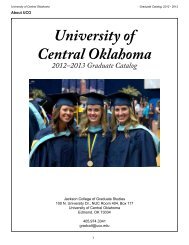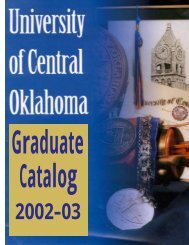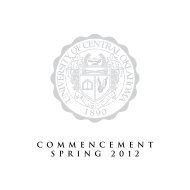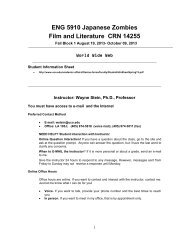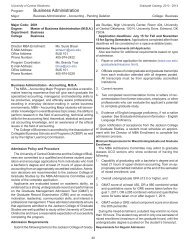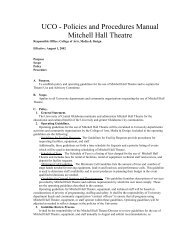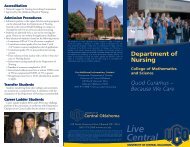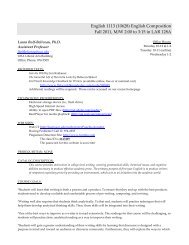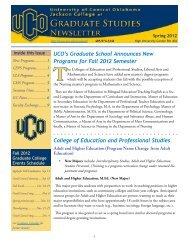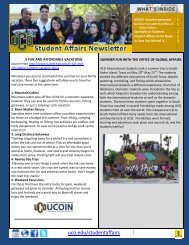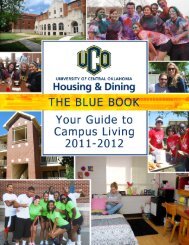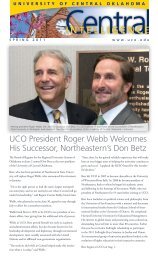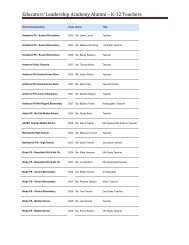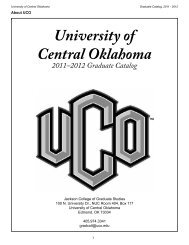“Blogging for Journalists” Syllabus MCOM 3813—Section 14633 ...
“Blogging for Journalists” Syllabus MCOM 3813—Section 14633 ...
“Blogging for Journalists” Syllabus MCOM 3813—Section 14633 ...
Create successful ePaper yourself
Turn your PDF publications into a flip-book with our unique Google optimized e-Paper software.
<strong>“Blogging</strong> <strong>for</strong> <strong>Journalists”</strong><br />
<strong>Syllabus</strong><br />
<strong>MCOM</strong> <strong>3813—Section</strong> <strong>14633</strong><br />
Fall 2013<br />
Class meets 9:30-10:45 TR—COM 215<br />
Dr. Terry M. Clark<br />
Office: UC 319. e-mail: tclark@uco.edu; Phone 974-5122<br />
Office hours: 8:00-9:15 TR, 9-12 W<br />
COURSE DESCRIPTION: Blogging <strong>for</strong> Journalists prepares students to<br />
understand, analyze and utilize the role and operation of Internet blogs in<br />
journalism culture and practice. The course gives students practical experiences<br />
in creating and maintaining a blog. Prerequisite(s): ENG 1113, ENG 1213, <strong>MCOM</strong><br />
1133 and junior or senior standing.<br />
COURSE OBJECTIVES: To enable you to establish and maintain a blog; to<br />
familiarize you with the impact and reach of Internet blogging in journalism and<br />
other fields; to improve your writing through weekly postings, and assignments.<br />
TRANSFORMATIVE LEARNING: This course addresses three of the university’s<br />
trans<strong>for</strong>mative learning goals—discipline knowledge (journalistic writing and blogging;<br />
problem-solving--scholarly and creative pursuits (Setting up and maintaining a blog,<br />
research and presentation) ; and health and wellness (The ability to take criticism,<br />
and thus mental health by avoiding failure).<br />
Course Requirements:<br />
1. Faithful attendance. Grade will drop one level <strong>for</strong> each three absences. You<br />
may not make up missed in class writing and take a 0. If you miss more than<br />
six class sessions, you will flunk. NO LATE WORK. Any late work will<br />
earn a “0.”<br />
2. Be on time to class. Three tardies equal an absence.<br />
3. Design and creation of a blog.<br />
4. The ability to write grammatically correct complete sentences.<br />
5. Weekly postings of original content on the blog, including class notes,<br />
and speaker stories. Beginning with the end of week two, blog posts<br />
must be each week. If you miss a week, you lose those points.<br />
6. Weekly following and comments on all other class members’ blogs.<br />
7. Following a professional blog in your area, with blog report,<br />
presentation.<br />
8. 500-word essay on blogs in today’s world.<br />
9. Bring text to every class.<br />
10. Follow http://blogblog.uco.blogspot.com,<br />
http://clarkcoffee.blogspot.com<br />
Editor’s note on attendance: Grade will drop one level <strong>for</strong> every two absences. If<br />
you miss six or more class sessions, you will flunk. If you have a medical<br />
condition that will mean extensive absences, you must notify the professor the<br />
first week of class, with documentation.
Text: Google Blogger <strong>for</strong> Dummies. Susan Gunelius. Wiley, 2009<br />
Recommended Texts:<br />
• JournalismNext. Mark Briggs. CQ Press, 2010.<br />
• The Huffington Post’s Complete Guide to Blogging. Simon and<br />
Schuster.com, 2008.<br />
Required web sites:<br />
• Technorati.com;<br />
• BlogOklahoma.com;<br />
• mashable.com;<br />
Recommended web sites:<br />
• pioneerwoman.com;<br />
• Huffingtonpost.com<br />
GRADING SCALE: 100-91--A; 90-81--B; 80-70--C; 60-69--D.<br />
• Creation, design, improvement and maintenance of blog—300 points<br />
• Weekly posts—300 points<br />
• Blog Essay—100 points<br />
• Blog presentation, paper—150 points<br />
• Blog comments—50 points<br />
• Final test, multiple choice—100 points<br />
• Total: 1,000 points<br />
• Note: The final test will be over blogging terms from the text and class,<br />
and comments from the speakers.<br />
This syllabus is fluid. As a class committed to trans<strong>for</strong>mational learning, your<br />
participation and interaction is expected and encouraged. You will help modify<br />
and establish the syllabus requirements and course content. <strong>Syllabus</strong> may be<br />
amended at any time by professor.<br />
COURSE SCHEDULE<br />
• Week one-- Intros, trans<strong>for</strong>mational workshop—student syllabus<br />
requirements, organization, syllabus, intros to blogging, course requirements;<br />
• Week two-- Text intro, chapters 1-3; Designing the blog, vocabulary, selection<br />
of blog favorites; professor’s critique of blogs<br />
• Weeks three, four--Text chapters 4-6; Writing <strong>for</strong> the web, typography<br />
• Week five—Text chapter 7—templates; Guest speaker<br />
• Week six— Text chapter 8—Refinements; Progress reports<br />
• Week seven—Text chapter 9--Management<br />
• Week eight,--Text chapters 12, 13; networking, Blog essay due.<br />
• Week nine—Fall break<br />
• Week ten-- text chapters 10.11, business; Guest speaker<br />
• Week twelve—blog reports
• Week thirteen—blog reports<br />
• Week fourteen—blog reports.<br />
• Week fifteen—blog reports, Thanksgiving<br />
• Week sixteen—blog reports, evaluation<br />
• Final—9 am, Dec. 10.<br />
Blog essay assignment: For this assignment, you must write a 500-‐word essay in <br />
which you describe the current impact of blogging on American culture and <br />
journalism. You must provide links to your source material. All in<strong>for</strong>mation about <br />
blogging is easily available on the web. You can easily obtain this material through <br />
simple Google searches. You might ask yourself these questions as you prepare to <br />
write your essay: How do blogs compete with traditional media sources? How <br />
important are blogs in politics? Do blogs promote democracy? What are the <br />
drawbacks of blogs? Ultimately, you must make a claim, or argument, about the <br />
significance of blogs in today's world. (Thanks to Dr. Kurt Hochenauer <strong>for</strong> this <br />
assignment.) More guidelines will be on http://blogbloguco.blogspot.com <br />
Blog report guidelines: 10-15minute presentation to class about your<br />
professional blog selection, evaluating it <strong>for</strong> content, effectiveness and design<br />
and how it has influenced you. One page outline to class. Three-page paper<br />
professor. More guidelines on http://blogbloguco.blogspot.com <br />
• All university policies regarding grading, grade appeals, academic dishonesty,<br />
adding and dropping apply. See appropriate university publications.<br />
www.uco/academic-affairs/aa-<strong>for</strong>ms/faculty/StudentinfoSheet.pdf<br />
• Any case of plagiarism will result in a 0 <strong>for</strong> the entire assignment. A second<br />
case will flunk you <strong>for</strong> the course, and ruin your future as a journalist.<br />
• UCO subscribes to the Turnitin.com plagiarism prevention service. Students agree that by taking<br />
this course, all required assignments may be subject to submission <strong>for</strong> textual similarity review to<br />
Turnitin.com <strong>for</strong> the detection of plagiarism. All submitted assignments will be included as source<br />
documents in the Turnitin.com restricted access reference database <strong>for</strong> the purpose of detecting<br />
plagiarism of such assignments. In the UCO Student Handbook, there is a process <strong>for</strong> contesting<br />
any plagiarism allegations against you.<br />
• Note: Turn off cell phones or pagers. No texting. If your phone or pager<br />
goes off or you text, in class, you must leave and take a 0 <strong>for</strong> the day.<br />
DEADLINES: Must be met. Absolutely. Period. End of discussion. Journalism<br />
is a deadline business. Accordingly, late work will not be accepted. Don’t bother<br />
to hand it in—you get a “0” grade. Absence is no excuse.<br />
Department of Mass Communication Policies – Fall 2013<br />
Departmental Phone: (405) 974-5303<br />
Website: http://www.uco.edu/la/masscomm/<br />
UCentral Student Media has an app! Go to iTunes to download it <strong>for</strong> free!<br />
Follow the department Twitter account @UCO_<strong>MCOM</strong><br />
“Like” the UCO Department of Mass Communication Facebook Page!<br />
Student Advisement:<br />
<strong>MCOM</strong> has two Student Success Advisors <strong>for</strong> <strong>MCOM</strong> majors.<br />
• Ms. Albani Milton-Smith advises Interpersonal Communication and Professional Media majors.<br />
o Office: COM 103<br />
o Phone: 974-5140
o Email: amilton3@uco.edu<br />
• Ms. Heather Peck advises Organizational Communication, Photographic Arts, and Strategic<br />
Communication majors.<br />
o Office: COM 103 A<br />
o Phone: 974-5108<br />
o Email: hpeck3@uco.edu<br />
Each student is responsible <strong>for</strong> seeking advisement in<strong>for</strong>mation each semester in order to graduate in a<br />
timely manner.<br />
UCO Media Ethics Conference: Wednesday, September 25 and Thursday, September 26<br />
Contact Yvette Walker, Edith K. Gaylord Endowed Ethics Chair, <strong>for</strong> more in<strong>for</strong>mation at ywalker@uco.edu.<br />
UCentral Student Media: http://www.uco.edu/la/masscomm/ucentral/index.asp<br />
UCentral is the student media network at the University of Central Oklahoma, featuring traditional media<br />
(television, radio, newspaper) and new media (web, netcasts, social networking) created by students<br />
majoring in professional media. UCentral is located within the Mass Communication Department on the<br />
campus of UCO.<br />
UCO Student Code of Conduct: Students are responsible <strong>for</strong> all in<strong>for</strong>mation in the Student Code of<br />
Conduct 2013-2014. This can be accessed on the Student Affairs Publications website at<br />
http://www.uco.edu/student-affairs/conduct/index.asp.<br />
ACADEMIC DISHONESTY AND PLAGIARISM:<br />
The UCO Student Code of Conduct describes Academic Dishonesty and outlines the steps <strong>for</strong> disciplinary<br />
action in the Guidelines <strong>for</strong> Alleged Academic Dishonesty. This in<strong>for</strong>mation can be found in Section III, C, 3<br />
& 4.<br />
Academic dishonesty: Includes but is not limited to the “giving” and “taking” of improper assistance in<br />
examinations and assignments; not adhering to correct procedures <strong>for</strong> identification of sources in reports<br />
and essays and all creative endeavors; intentional misrepresentation; cheating; plagiarism; and<br />
unauthorized possession of examinations. The UCO Student Code of Conduct provides further details.<br />
Additionally, any work submitted as an assignment <strong>for</strong> one class may not be submitted <strong>for</strong> credit in another<br />
class, without prior permission of the professor. Any work so submitted will receive an automatic "0."<br />
Plagiarism: When a student submits any assignment <strong>for</strong> a course (written, oral, videotape, audiotape,<br />
photograph or Web Site), the student will submit entirely original work or will properly cite all sources utilized<br />
in the preparation of the assignment. Without proper citation, the student is guilty of plagiarism, which is not<br />
tolerated at UCO.<br />
As a student, you are responsible <strong>for</strong> understanding what constitutes plagiarism. You should talk to your<br />
professor to ensure that you can recognize and avoid all types of plagiarism. Plagiarism occurs in two<br />
primary ways:<br />
1. Word-<strong>for</strong>-word copying, without acknowledgement, of the language or creative work of another person.<br />
Having another person complete all or part of your assignment is plagiarism and is clearly <strong>for</strong>bidden.<br />
But, in addition, the student should include NO written, video, audio, or photographic material from an<br />
existing source, no matter how brief, without acknowledging the source. When using the written words<br />
of an existing source in your assignment, either place the borrowed words in quotation marks or set the<br />
quotation aside as a block quotation. Additionally, you must include the citation <strong>for</strong> the material in your<br />
assignment. This applies to even the briefest of phrases if they are truly distinctive.<br />
2. The unacknowledged paraphrasing of an author’s ideas. The student should no more take credit <strong>for</strong><br />
another person’s thoughts than <strong>for</strong> another person’s words. Any distinctive, original idea taken from<br />
another writer should be credited to its author. If you are not sure whether or not an author’s idea is<br />
distinctive, you should assume that it is: no fault attaches to over-acknowledgement, but underacknowledgement<br />
is plagiarism. Most style manuals (e.g., Publication Manual of the American<br />
Psychological Association) provide in<strong>for</strong>mation concerning how to paraphrase and cite the ideas and<br />
writings of existing sources.<br />
Students may be dismissed from the university <strong>for</strong> plagiarism. University guidelines provide a range of<br />
disciplinary action dependent upon the severity of the offense including but not limited to: requiring a<br />
substitute assignment, awarding a reduced grade, awarding a failing grade <strong>for</strong> the assignment, awarding a<br />
failing grade <strong>for</strong> the course, or expelling the student from the university. Acknowledging that instances of<br />
plagiarism may range from minor to severe, the Department of Mass Communication allows the course
professor to determine the severity and the disciplinary action <strong>for</strong> the first instance of plagiarism committed<br />
by a student in the professor’s course. However, if that student commits plagiarism a second time in the<br />
course, departmental policy requires that the student receive both a failing grade (“F”) <strong>for</strong> the course and a<br />
referral to the UCO Student Conduct Officer. Students should make sure they understand professor<br />
expectations <strong>for</strong> sources and content to be cited.<br />
Turnitin.com Plagiarism <strong>Syllabus</strong> Statement: UCO subscribes to the Turnitin.com plagiarism prevention<br />
service. Students agree that by taking this course, all required assignments may be subject to submission<br />
<strong>for</strong> textual similarity review to Turnitin.com <strong>for</strong> the detection of plagiarism. All submitted assignments will be<br />
included as source documents in the Turnitin.com restricted access reference database <strong>for</strong> the purpose of<br />
detecting plagiarism of such assignments. Use of the Turnitin.com service is subject to the Terms and<br />
Conditions of Use posted on the Turnitin.com website. Turnitin.com is just one of various plagiarism<br />
prevention tools and methods which may be utilized by your faculty instructor during the terms of the<br />
semesters. In the UCO Student Handbook, there is a process <strong>for</strong> contesting any plagiarism allegations<br />
against you.<br />
University Policies<br />
ADA Statement Regarding Special Accommodations:<br />
The University of Central Oklahoma complies with Section 504 of the Rehabilitation Act of 1973 and the<br />
Americans with Disabilities Act of 1990. Students with disabilities who need special accommodations must<br />
contact Sharla Weathers, B.S., C.S.R. in Disability Support Services [sweathers2@uco.edu] in room 309 of<br />
the Nigh University Center, (405) 974-2549. It is the student’s responsibility to contact the instructor as soon<br />
as possible after DSS has verified the need <strong>for</strong> accommodations to ensure that such accommodations are<br />
implemented in a timely fashion.<br />
Trans<strong>for</strong>mative Learning: http://www.uco.edu/central/tl/<br />
“At the University of Central Oklahoma, we help students learn by providing trans<strong>for</strong>mative experiences so<br />
that they may become productive, creative, ethical and engaged citizens and leaders contributing to the<br />
intellectual, cultural, economic and social advancement of the communities they serve. Trans<strong>for</strong>mative<br />
learning is a holistic process that places students at the center of their own active and reflective learning<br />
experiences. All students at UCO will have trans<strong>for</strong>mative learning experiences in five core areas:<br />
leadership; research, creative and scholarly activities; service learning and civic engagement; global and<br />
cultural competencies; and health and wellness.”<br />
Class Attendance: (Taken from the 2013-14 Faculty Handbook, 3.1)<br />
The university expects students to regularly attend classes in which they are enrolled. Faculty members are<br />
expected to establish specific attendance policies governing their classes. Attendance policies must appear<br />
in the course syllabi. Faculty members may require appropriate documentation to verify absences. Students<br />
are responsible <strong>for</strong> work missed due to absences. It is the student’s responsibility to initiate a request to<br />
make up class work or examinations missed.<br />
Individual policies must allow <strong>for</strong> a reasonable but not unlimited, number of excused absences, <strong>for</strong> legitimate<br />
reasons. Excused absences approved by faculty members should be consistently applied to all students. An<br />
excused absence means that an instructor may not penalize the student and must provide a reasonable and<br />
timely accommodation or opportunity to make up exams or other course requirements that have an impact<br />
on course grade. Excused students should be allowed the same opportunities as students who were present<br />
in class.<br />
Faculty members are obligated to honor the following circumstances as excused absences:<br />
a. travel considered part of the instructional program of the university and<br />
requiring absence from class (e.g. field trips, research presentations, etc.);<br />
b. invited participation in activities directly and officially sponsored by and in the interest of the university<br />
(e.g.<br />
athletic teams, debate teams, dance company, etc.);<br />
c. jury duty;<br />
d. military obligation (See Appendix K.);<br />
e. serious illness, medical condition, accident, or injury; and<br />
f. death or serious illness in immediate family.<br />
Additional policies <strong>for</strong> this course are included in the Fall 2013 UCO Student In<strong>for</strong>mation Sheet and<br />
<strong>Syllabus</strong> Attachment that can be accessed at http://www.uco.edu/academic-affairs/


